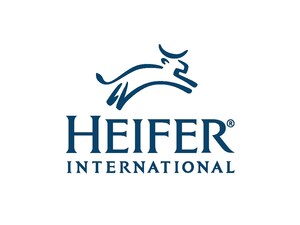TEGUCIGALPA, Honduras and LITTLE ROCK, Ark., Nov. 19, 2024 /PRNewswire/ -- Heifer International urges an immediate and direct support focus on resilience-building for smallholder farmers as Tropical Depression Sara unleashed torrential rains across Honduras, Guatemala, Belize and Mexico's Yucatán peninsula, threatening the lives and economic prosperity, mainly of vulnerable rural populations.
Tropical Depression Sara formed Thursday afternoon and stalled over Honduras and Guatemala over the weekend, affecting more than 123,000 people and dumping 19.7 inches (500 mm) of rain in some parts of Honduras, swelling rivers and driving up risks of life-threatening flash flooding and mudslides across Central America.
"The damage this storm will have on the lives and livelihoods of rural population across Central America underscores the urgency of bold climate action," said Oscar Castañeda, Heifer's senior vice president of Americas programs. "This year's COP29 discussions in Baku must prioritize the adaptation and resiliency needs of rural farmers, whose contributions to global food security and local economies are critical and cannot be overlooked."
Storms are one of many climate-related risks that threaten smallholder farmers, who produce up to 80% of the food in low- and middle-income countries and are particularly vulnerable during crises due to a lack of access to financial safety nets and their livelihood's dependence on fragile ecosystems. In Central America, for example, Tropical Depression Sara follows a prolonged drought, which has led to widespread crop failures and increasing rates of hunger and poverty.
In Central America, Heifer International is working with local partners to assess the damage and provide immediate relief to affected families. In Honduras, over 3,200 houses have been destroyed and almost 1,800 farming communities are currently cut off from communication due to damaged infrastructure. In rural agricultural communities where Heifer Honduras works, significant losses of beehives, corn, beans and livestock have been reported. Beyond initial aid, the organization is committed to long-term resilience-building measures for smallholders, including:
- Sustainable Livestock for Thriving Communities and Ecosystems: In Honduras, Heifer trains dairy farmers to increase biodiversity, climate-resilient fodder crops, and soil management and improving watershed management. By adopting practices such as rotational grazing, integrating trees into pastures, and using innovative breeding techniques, farmers can boost milk production while preserving the surrounding ecosystems.
- Regenerative agriculture as a pathway to soil health: In Guatemala's Green Business Belt program, Heifer supported 6,500 spice farmers in transitioning to agroforestry, which has boosted income while restoring soil health and sequestering significant amounts of carbon.
About Heifer International
Since 1944, Heifer International has worked with more than 52 million people around the world to end hunger and poverty in a sustainable way, while caring for the Earth. Heifer currently operates in 19 countries across Africa, Asia, and the Americas, including the United States, supporting farmers and food producers to strengthen local economies and build secure livelihoods that provide a living income. For more information, visit https://www.heifer.org.
Logo - https://mma.prnewswire.com/media/2286250/Heifer_Logo.jpg






Share this article